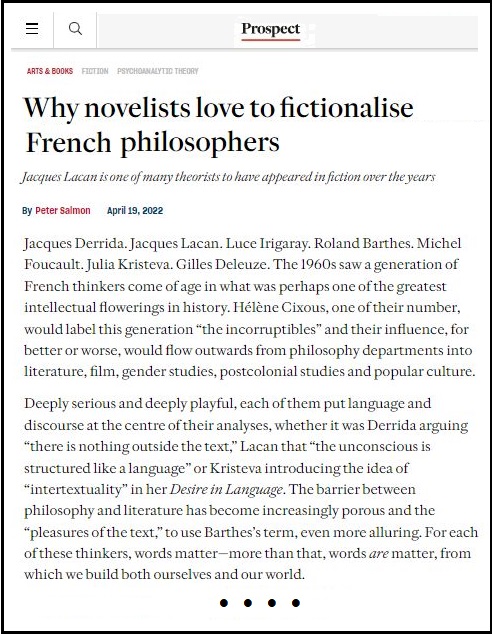May '68 Revisited
"At his final Paris campaign rally… Mr. Sarkozy declared himself the candidate of the 'silent majority,' tired of a 'moral crisis in France not seen since the time of Joan of Arc.'
'I want to turn the page on May 1968,' he said of the student protests cum social revolution that rocked France almost four decades ago.
'The heirs of May '68 have imposed the idea that everything has the same worth, that there is no difference between good and evil, no difference between the true and the false, between the beautiful and the ugly and that the victim counts for less than the delinquent.'
Denouncing the eradication of 'values and hierarchy,' Mr. Sarkozy accused the Left of being the true heirs and perpetuators of the ideology of 1968."
— Emma-Kate Symons, Paris, May 1, 2007, in The Australian
Related material:
From the translator's introduction to Dissemination, by Jacques Derrida, translated by Barbara Johnson, University of Chicago Press, 1981, page xxxi —
"Both Numbers and 'Dissemination' are attempts to enact rather than simply state the theoretical upheavals produced in the course of a radical reevaluation of the nature and function of writing undertaken by Derrida, Sollers, Roland Barthes, Julia Kristeva and other contributors to the journal Tel Quel in the late 1960s. Ideological and political as well as literary and critical, the Tel Quel program attempted to push to their utmost limits the theoretical revolutions wrought by Marx, Freud, Nietzsche, Mallarme, Levi-Strauss, Saussure, and Heidegger."
This is the same Barbara Johnson who has served as the Frederic Wertham Professor of Law and Psychiatry in Society at Harvard.
Johnson has attacked "the very essence of Logic"–
"… the logic of binary opposition, the principle of non-contradiction, often thought of as the very essence of Logic as such….
Now, my understanding of what is most radical in deconstruction is precisely that it questions this basic logic of binary opposition….
Instead of a simple 'either/or' structure, deconstruction attempts to elaborate a discourse that says neither 'either/or', nor 'both/and' nor even 'neither/nor', while at the same time not totally abandoning these logics either."
— "Nothing Fails Like Success," SCE Reports 8, 1980
Such contempt for logic has resulted, for instance, in the following passage, quoted approvingly on page 342 of Johnson's translation of Dissemination, from Philippe Sollers's Nombres (1966):
"The minimum number of rows– lines or columns– that contain all the zeros in a matrix is equal to the maximum number of zeros located in any individual line or column."
For a correction of Sollers's Johnson's damned nonsense, click here.
Update of May 29, 2014:
The error, as noted above, was not Sollers's, but Johnson's.
See also the post of May 29, 2014 titled 'Lost in Translation.'
























